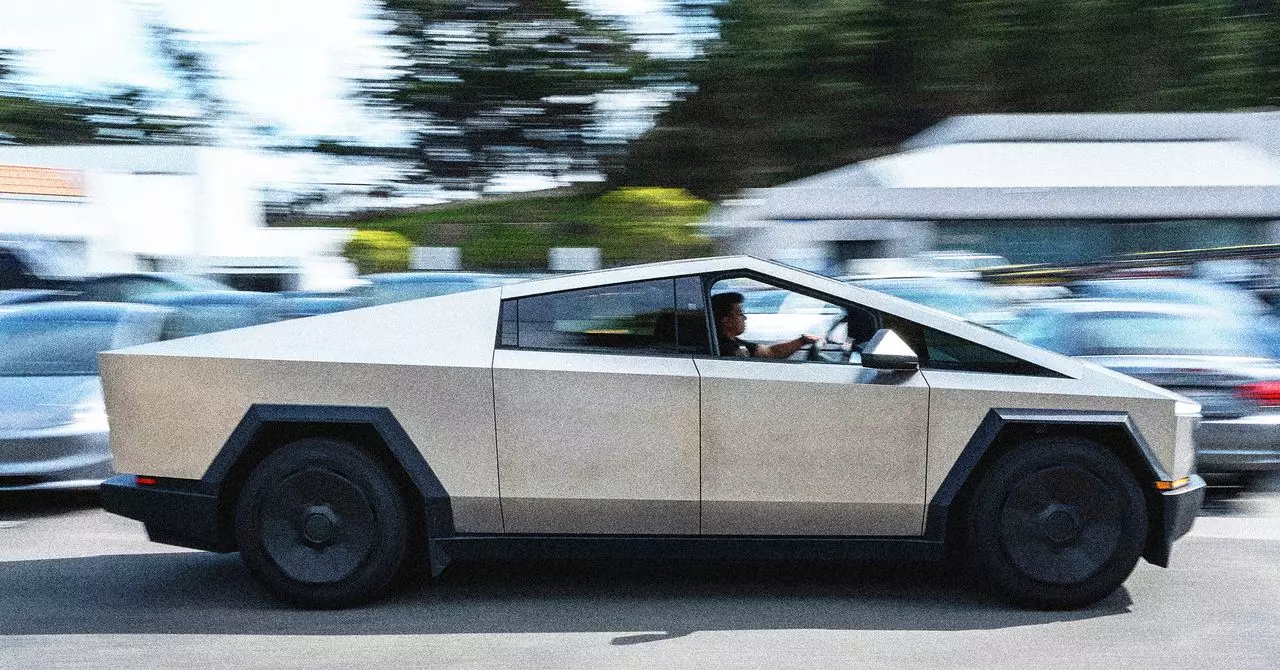Tesla has made waves with its introduction of the Cybertruck, an all-electric pickup that stands apart for its unconventional design and formidable performance. However, the excitement surrounding this groundbreaking vehicle has been somewhat tempered by the announcement of a significant recall impacting nearly all units produced to date. With over 46,000 Cybertrucks manufactured between November 2023 and February 2025 affected, this marks the eighth recall for a vehicle that was celebrated for its innovative features. What is alarming, however, is that Tesla’s latest production shortcoming is centered around a crucial issue that cannot be resolved through a simple over-the-air software update—a clear departure from Tesla’s typical approach to resolving vehicle issues.
The Cost of Cosmetic Flaws: More Than Just an Aesthetic Issue
At the heart of this recall lies an adhesive issue related to a stainless steel trim panel that has the potential to detach while driving, posing a serious road hazard. While many might brush this off as an inconsequential cosmetic defect, the implications of a loose trim piece extend beyond mere aesthetics. The situation raises questions about the very integrity of the vehicle itself. If a minor component can inadvertently detach, how can consumers be confident in the sturdiness of other critical systems? This concern becomes even more pressing given the Cybertruck’s reputation and the expectations placed upon it by early adopters.
This recall signals a pressing need for the company to reassess its quality control measures. By relying on a glue that has proven problematic, Tesla places its reputation on the line. Traditional automotive manufacturing has long relied on mechanical fasteners—bolts, rivets, and welding—to bond components effectively, which raises questions about why Tesla opted for an adhesive approach for a vehicle already known for its heavy use of metallic materials.
Tesla’s Unique Challenges with Stainless Steel
The Cybertruck’s distinctive stainless steel body is one of its design signatures, but it also introduces an array of challenges. Industry experts like Dale Harrow of the Royal College of Art emphasize that gluing techniques are widespread in modern car manufacturing, where weight savings are essential for electrical vehicles. However, the peculiarities of using stainless steel—primarily its thermal conductivity—could result in distinct bonding issues.
Harrow suggests that the problems might stem from inadequate curing processes attributable to the metal’s specific properties. If this theory holds merit, it raises significant questions about the production line’s conditions—temperature control, UV exposure, and manufacturing practices. While Tesla has repeatedly touted its engineering capabilities, developments like this recall reveal that there may still be fundamental oversights in its production processes that could compromise consumer safety.
Investigating the Response: Is Tesla Prepared for Quality Control Challenges?
What is particularly striking about this situation is Tesla’s apparent reactive stance. With complaints about the loose trim bubbling up on social media, it became clear that consumer feedback often serves as the catalyst for internal investigations. It’s ironic that a company renowned for its cutting-edge technology and software solutions still struggles with the physical products it creates. The delayed response and the need for physical service visits stand in stark contrast to the digital age of instantaneous resolutions.
The fix involves utilizing a different adhesive more resistant to environmental variables—a commendable step, but it raises further questions about why the initial choice was flawed in the first place. Consumers may ponder whether Tesla has the robust quality assurance measures in place to identify such critical issues before they escalate into recalls.
In an age where environmental consciousness and heightened consumer expectations converge, Tesla must strive to balance innovation with unwavering quality assurance. The Cybertruck recall serves as a pivotal moment in their journey, serving as a learning opportunity wrapped in embarrassment for a company that prides itself on trailblazing the automotive industry. Going forward, how Tesla responds to this setback will be crucial in retaining the loyalty of its customer base while ensuring the company’s long-term success in an increasingly competitive electric vehicle marketplace.

